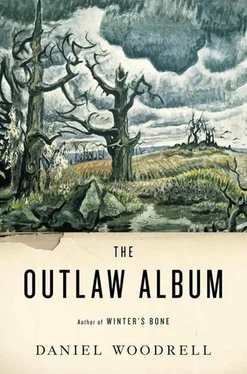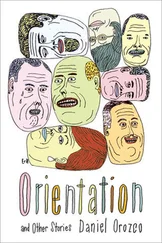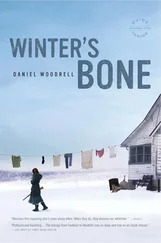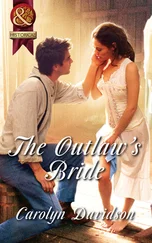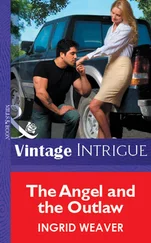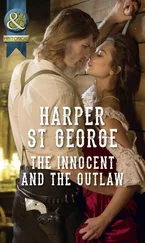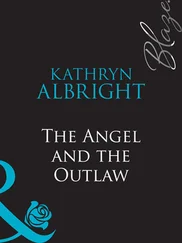I set the easel above the cow, considered colors I might use, colors that’d catch the feeling of this killed cow, the tragedy of last night that was already nearly forgot, while the cliff and tree and bullet hole’d tell the facts of the story. The color of the actual cow meant nothing now, so I’d fit some to it—colors that suited would come about somehow as my brush moved, and the tree would get rendered the same. I sensed blue for the cow and bronze for the tree and blue again for the killing ground that waited below the tense yellow cliff. The sky grew plum and gray and rippled like a window curtain. As I made the picture, the scene in my head took over and the cliff turned up flat on me, so the plum-gray sky was standing sentry over to the right, and the cow in the sideways tree hung above level ground but below the branch, disobeying gravity now that it’d died.
The bullet hole was a pink question mark.
Ma had walked the pasture counting heads while I was lost deep inside that scene with the cow, and crept along behind me. I was adding chrome boulders to the stream, and when I caught a creeping sound behind I fast as a flinch reached for the rifle, but the rifle wasn’t there, and I sprang for the dirt with one hand shielding my face while the other aimed the paintbrush. The brush swept back and forth, wanting to spray a wide field of fire, a death blossom, get ’em all, and I felt wiggly in my head as a few drops dove loose to dribble down me.
Ma said, “That cow’s money lost now.”
They tell me Dad committed suicide for reasons he dreamed up. His mind was too active. He had a round mind and it roamed. He could imagine any kind of hurt. He could imagine the many miseries of this world flying over from everywhere to roost between his ears, but he couldn’t imagine how to get away. Ma loved him past his end and has never kissed another man. She loved his mind, his round, roaming mind that made her feel a glowing inside her skin between those spells of blight. He waited all of a calm spring night for some fresh serious pain to come into his heart and kill him. Twelve coiled hours hunched at the kitchen table, frozen peas dumped on the tabletop, a shotgun leaning against the back of his chair. He arranged rank after rank of cold green peas, took aim, and flicked each toward the kitchen sink and kept a secret score. Then he gathered the peas from the sink and floor, rearranged them across the tabletop, and flicked them all again. Once the peas were ruined, he switched to flicking corn kernels, raisins, whatever, until the score was lost in his head and the floor slippery. He drank enough coffee his brain shook in its bowl, then drank whiskey to get that shaky brain calm. At some point inside that addled calmness the heavy curtains parted and he thought he spied a good way out, an answer to it all—stepped to the back stoop and sat and erased his problems in this world, maybe not the next. He died gushing blood on the second step of the back stoop, the step we keep painted black.
I don’t truly remember, but Ma has told me about it, made it meaningful to me, saying I followed him onto the stoop, my rusty diaper drooping, and the ejected shell bounced off my belly, and Dad tried to say one last word to me but it drowned in blood that jumped up in his throat, never got said. So now I do sort of recall an ejected shell bouncing from my baby-belly, blood flying, that one last word drowning in red.
He’s buried out back, Buddy Girard, and Ma prays at his grave.
Ma? Ma? She’s not all there; parts have fallen away and dashed, dashed against her days, parts that fell the day she was pulled from school at sixteen and sent to work at the shoe factory, parts that fell the day the shoe factory closed, the day Marcella died in her crib, the day she was told she had cancer, the day Dad died on that one black step. She has always carried on, though, Ma, hefting the parts of herself that remained, dragging them onward, and remaining more decent than she had to be, which makes me try to stay alive for her.
Ma wants to be buried on the farm. She’d been happy here when she was too young to know better and during the first year with Dad. Her grave will be near the rest, but not quite with them, several paces to the west of the others, under the dirt with Buddy. I’ve squared the plot with railroad ties, and we’ve planted perennials along the border, purple phlox and daisies and such that wave spirited colors when a breeze passes. The graves overlook the river and are well shaded in summer until about noon, then the good light reaches and grows things there. A spot has been picked for me, also, to the sundown side, and I’ve found my marker, a reddish river stone with battered edges and a kind of cracked, silent dignity. It’s too big to throw or kick away. The stone will remain unchanged, no name or date, and someday vines and flowers will cover the stone in tangled green and sweetness. Ma wants a regular wooden cross about three feet tall, painted white, same as Dad had before a high wind flung his away.
You have to know where to stand to stand over his grave.
I like graves that disappear.
Mary is the woman who has chosen me to be the man she needs. She has rooted inside my life and claimed me, claimed me to be her man of tomorrow and the days after, claimed me for loving, too, I guess. She lives with her momma four miles away, near where Chime Creek joins the Twin Forks, in a trailer with her kids, two of them, Joe and Nora, neither old enough for school but both already hunkered down into a fretful shyness, a reluctance to be noticed or speak up. Mary likes to visit me after dark, once the bars have got boring, raise dust driving her heavy rattling car into Ma’s yard, and park under the spreading oak, radio music kicking holes through the night quiet.
She grunts getting out of the car, slams the door. Most times she’ll have a movie in her hand, whatever beer is left tucked under her arm. Her moccasins are silent crossing the dirt.
This time, same as always, I greet her with “Mary.”
“Yup. Once again.” She’s taller than she wants to be and rolls her shoulders forward to shorten her neck, drops her chin, sags her upper self like a flower that’s got a blooming too heavy atop for its stem to carry. She holds the movie toward me, shakes the box. “How ’bout a picture show, Darden?”
“Funny?”
“Could be to you.”
Mary wants to kiss, so I do, and she wants some sort of familiar caress, one that suggests we know each other’s bodies like favorite getaway places we’ve come to own, so I put both hands to her butt and pull the cheeks spread a little bit, lift her. Mary has a small beer pooch underslung from her lower belly, but is elsewhere lean, skinny, even, and I can about feel the bone under her butt with my fingertips. She’s got pale hair and a few freckles that seem to be forever fading from her face but never go away.
In the living room she right away wants me to get naked. Ma’s bed is downstairs so she can be near the john, and she lays snoring in the dining room, just around the corner. The TV is muted but on, throwing a headache light across the room, throbbing between near dark to suddenly glaring, with many skittish flickers between. I know I’m supposed to want this, what she offers, so I try to recall how it goes when this is something you want, crave, gotta have, can’t do without, might kill for, die over, mourn when it’s gone.
Somehow my clothes come off, drop to the floor, first frost stripping a tree of its last clinging leaves.
“Such a tight, smooth boy,” she says. Mary is pushing nine years older, and unlike most women would do she apparently enjoys reminding me I’m way younger. It somehow stokes her needs and juices her good to say it aloud. Whenever she says it she sighs soft and looks like a crouched cat studying songbirds in a low bush. “Lucky ol’ me. Lucky, lucky.”
Читать дальше
